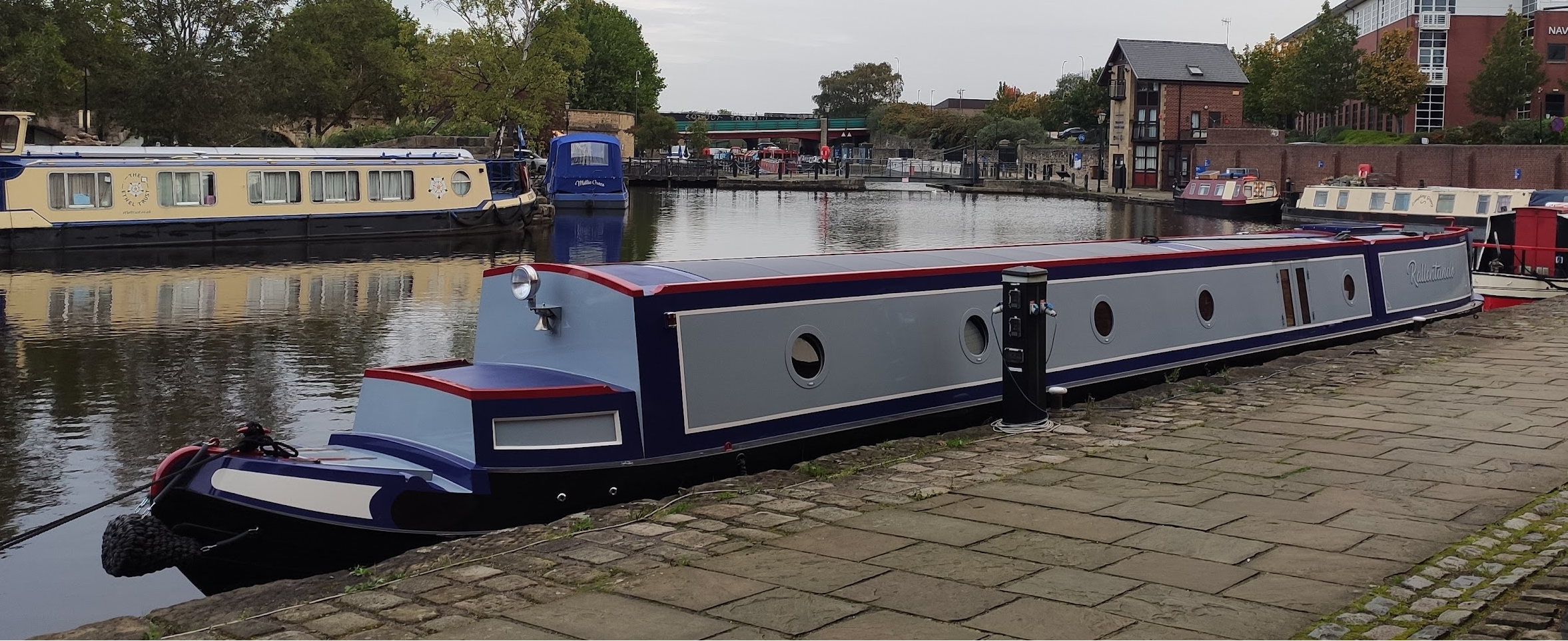-
Posts
15,957 -
Joined
-
Last visited
-
Days Won
117
Content Type
Profiles
Forums
Events
Gallery
Blogs
Store
Everything posted by IanD
-
And then there's the other review you've often posted which included the Kobra, which came out very well but isn't tested here... 😉 (every review I've found has different conclusion about what is "the best" -- depending what they tested and how) What's clear in every review is that the Danforth comes out badly -- heavy, poor setting, poor holding power. But it's the most common anchor used on canal boats (or often a "Danforth-style" copy which may well be even worse!) because it's cheap and widely available and folds flat. Most of the modern anchors are much better, though the problem with many is that they're *very* expensive -- justifiable for (also often expensive!) yachts which rely on anchors daily in what can be tough offshore conditions (including swinging at anchor), less so for most boats on the inland waterways where the most likely use is stopping on a river after an engine/prop problem or mooring on a river...
-
Most hire bases charge for fuel used, which after all is the fairest case. A few include it with the hire charge, which is not really fair to the lighter-handed short-cruising-hours hirers who end up paying for the fuel used by the heavy-handed cruise-all-day-every-day-with-a-breaking-wash ones... 😉 Gas is always included, the costs are much lower anyway.
-
Do you have a daughter, or a son with a GF? 😉 So for you on your own with consistent ablutory habits (and a cassette toilet) gauges aren't really helpful. For others with guests on board they are. Different strokes for different folks... 😉 Needlessly stopping isn't the big problem. Running out of water because you thought there should still have been enough in the tank is worse -- no washing up, no showers, no toilet flushing... 😞 Though it has to be said, not as big a problem as unexpectedly finding your pumpout tank is full to the brim, on a Sunday, on the Rochdale canal, with no boatyard or pumpout anywhere close by... 😞 😞
-

A million questions narrowed down to a few, for now :)
IanD replied to Boater floater's topic in New to Boating?
With a typical narrowboat hull I don't think it's possible that adding more ballast low down (or lowering it) can reduce the metacentric height, especially if the boat doesn't sit lower in the water like in the case described... 😉 -
Now try that with other people on the boat, who may or may not take much longer showers than you do, and do it more often. Same applies to a black water tank, except not with showers obviously. Fuel tank is the least useful because it needs refilling much less often, but if you're going to have the others you might as well add it.
-

A million questions narrowed down to a few, for now :)
IanD replied to Boater floater's topic in New to Boating?
Lowering the CoG should make the boat more stable and less tender, not the other way round... -
You can't see the point of knowing how full all your tanks are? Really? Would you have a car without a fuel gauge? Modern pressure/level sensors don't stick.
-
That wasn't referring to you (post edited to make this clearer), it was the usual culprits who always think old is good and new is bad, regardless of whether this is actually the case or not... 😉 The sensors on mine are 4-20mA 0.1bar ones, which are reliable and accurate but not cheap. BTW I'd also recommend a Ruuvi tag on the calorifier... 😉
-
I've got level sensors on diesel, black and fresh water tanks (Cerbo + Tank 140), they all work well and I find them useful. If people want to guess or use a dipstick then go ahead, but that's not a good reason to disparage those who think gauges are better... 😉
-

T&M Closing between Middlewich and Hardingswood from 25 July
IanD replied to David Mack's topic in Stoppages
Speaking from experience -- no, canal closures don't allow you to cancel a hire boat or ask for any money back... 😞 -
Correct -- though I'm reasonably handy and an engineer but have zero experience of actually building boats, trying to do this myself instead of getting it done by people who know what they're doing would have been idiotic... 😉
-
Which is why obsessing about them and insisting that unless they're followed to the letter the sky will fall in is pointless, in spite of some people seemingly thinking otherwise... 😉
-
This post cannot be displayed because it is in a forum which requires at least 10 posts to view.
-
I'd say it's doubtful that most UK canal boats meet all the ISOs, never mind all the RCR rules... 😉
-
I've used that type of terminal (don't know if they're the exact same one) with no problems, and they were recommended by an electrician I trust as much better than a lot of alternatives -- they have the advantage of properly clamping down on the wire with a decent amount of force (those little levers are quite stiff!) not a screw that can come loose, accepting a wide range of cable sizes, and not having any live exposed terminals or screws. I expect they'd even work reliably on soldered multistrand cables, because if the solder tries to creep away the clamp will just follow it, as if it was a slightly thinner cable... 😉
-
Indeed -- and I had one appliance where the plug got very hot, the screw terminal had come loose as the soldered cable end squashed over time. And yes it had been properly tightened down to start off with... 😉 Of course it won't happen all the time but solder creep under stress is a well-known physical effect, and putting soldered multistrand cables into a screw connector is simply not a good idea, especially on anything that takes significant current -- better (or at least, less bad if it's relatively thin) to use bare stranded copper (twisted and double back if necessary), better still to use a ferrule. That's why electrical regulations say not to do it -- not because it guarantees a problem in lots of cases, but it does happen occasionally and can easily be avoided. Small screw connectors can take a surprising amount of current if the right-size cable is used and dressed properly and they're tightened properly and the screw doesn't go straight onto the cable, but there's obviously less margin for error than a bigger one... 😉
-
In other words -- when CART asked boaters if they'd be willing and able to pay for something that is currently free, over 50% of respondents said "no". Not exactly surprising, methinks... 😉
-
Except for all those who decide to keep the traditional dumb alternator charging a LA battery, and add the lithium battery in parallel with a long wire for protection... 😉
-
Nope, never said that -- obviously REC-BMS or Victron is better (especially for high-power use) but also *way* more expensive, so neither affordable or necessary for many boaters. As Will Prowse said, the BMS inside "drop-in" LFPs are a lot better than they used to be -- and almost certainly better than some DIY BMS put together and programmed by someone (not @nicknorman ! ) who got all their "knowledge" from YouTube... 😉 What I said is that using such a system with NMC cells -- especially ex-EV ones because they're cheap -- is a really bad idea, because you're totally reliant on the BMS to protect the cells, and if it doesn't (or is programmed wrongly) and they catch on fire that's probably bye-bye boat... 😞 With LFP cells/batteries the worst that's likely to happen is damage to the cells/battery -- expensive, but far less dangerous.
-
Which is exactly what you'd expect, and why NMC cells/batteries should *not* be used on boats -- or RVs, or anywhere else without the sophisticated integrated overvoltage/overcharging protection systems that EVs typically use***. And even there NMC battery fires happen, especially with physical damage -- though it has to be said, still far less often than ICE fires, and nobody clamours for petrol to be banned because of this... 😉 *** which is why using cheap ex-EV NMC cells/batteries on a boat -- often with a cheap DIY BMS/charge management system -- is a *really* bad idea... 😞
-
I'm pretty sure most of the CMers/rule-benders are perfectly well aware of what both the spirit and the letter of the CC rules are, they just don't want to follow them because it doesn't suit their lifestyle -- claiming that clarity is the problem is just trying to shift the blame from themselves to CART... 😞
-
How can you "fiddle" a license fee when CART already have information like boat length/width and type of license fee (HM or CC) which you tell them? Geographical license fees do have some detection/enforcement issues, but the point is that you only need to have checkers on the high-cost/honeypot parts of the system. Toll gates or charging for locks keep getting suggested, but a moment's thought shows they're simply not practical nowadays given manning costs -- the days of a badly-paid resident lockie/toll-collector in a peppercorn-rent BW canal cottage are long gone. The one thing that would work and be difficult to fiddle and could charge in any number of ways would be trackers on boats, but too many people objet to this on privacy grounds for it ever to be feasible.
-
You do know that there are spotters out on the canals? Especially in the "high-cost" areas? 😉
-
The problem with solder isn't that it's soft, it's that it creeps under stress -- "runs away" from the load, and I've certainly seen this happen. Stranded copper conductors once compressed into a terminal don't do this, so long as they're properly clamped in -- screw terminals where the screw bears directly on the conductors don't do this, you need ones with a plate/shim between the screw and the conductors. Lever terminal blocks/connectors do a much better job than the old-type bare-screw ones often seen in chocblocks -- at least, the decent quality ones do... 😉 https://www.amazon.co.uk/flintronic-Lever-Nut-Connectors-Electrical-Terminals/dp/B0BCNTVV4S?th=1
-
Why is it complicated? Anyone with a calculator can work it out in seconds, and CART can calculate the license fee automatically from the data they have -- which could include things like boat length/width/age and type of license and geographical area, but for obvious reasons not personal data like @Alan de Enfield referred to -- hopefully in jest... 😉 Or is your objection that some people -- for example, a widebeam CCer in a new boat -- might end up paying a *much* higher license fee than today? (while others would pay less, for example an old narrowboat with a home mooring...)




